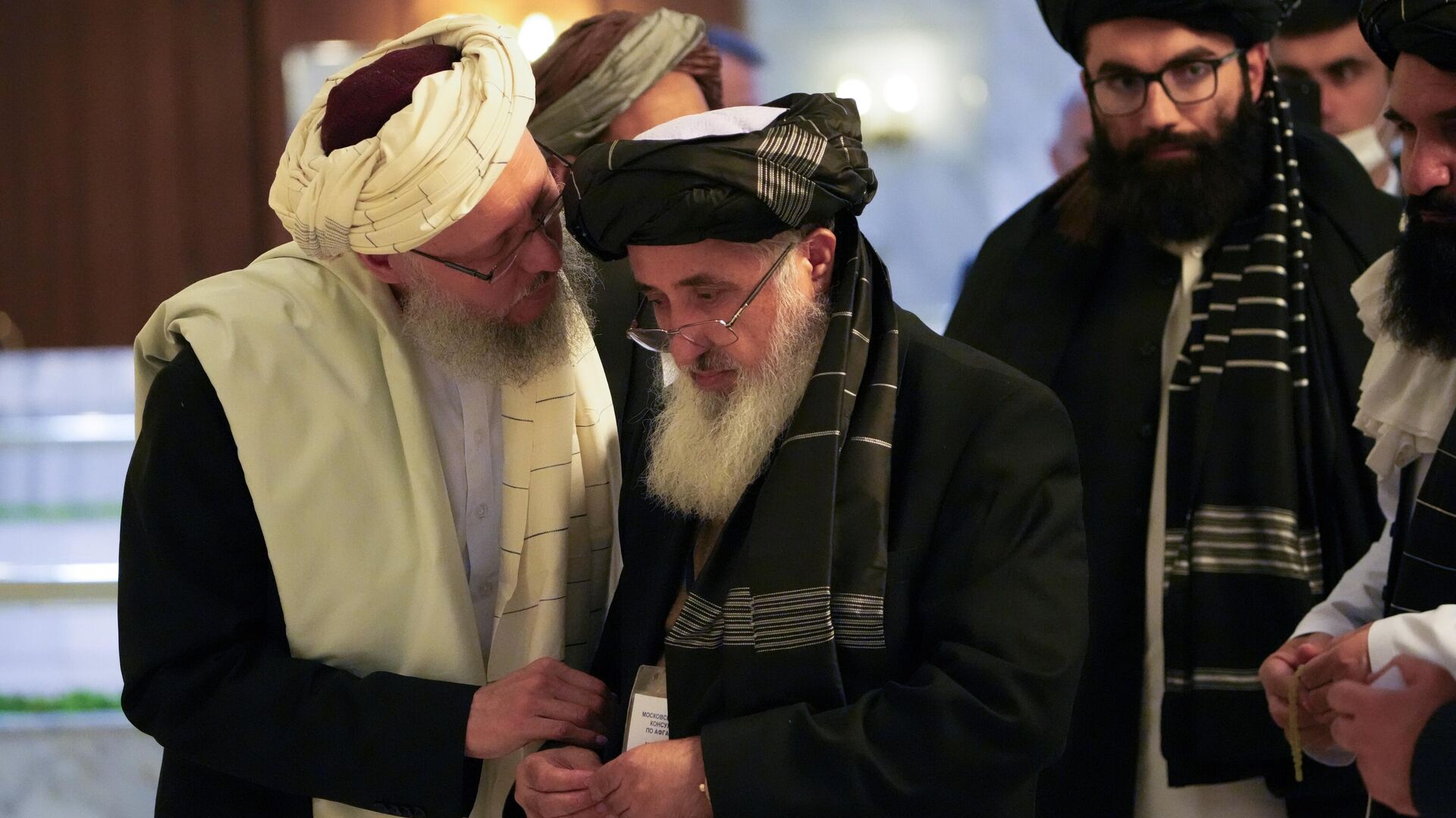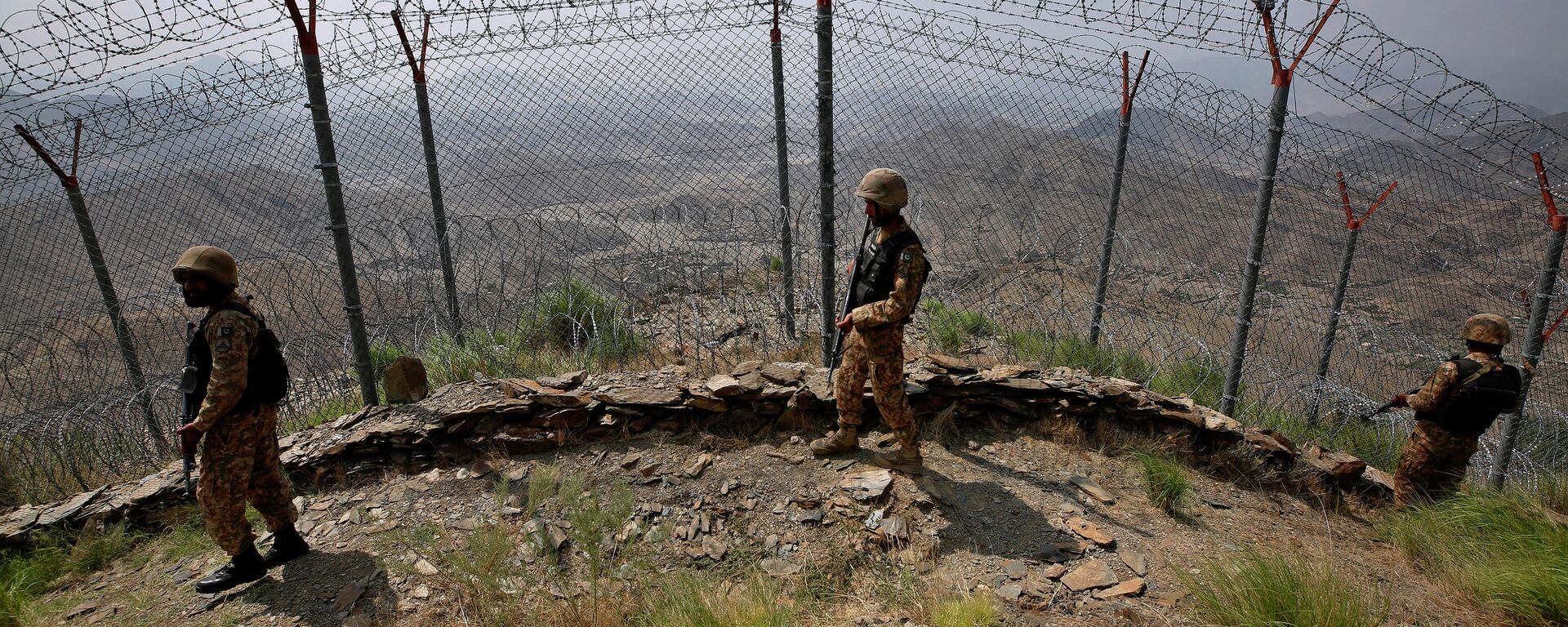https://sputniknews.in/20241213/what-awaits-pak-afghan-ties-after-isis-ks-killing-of-taliban-minister-haqqani-8545725.html
What Awaits Pak-Afghan Ties After ISIS-K's Killing of Taliban Minister Haqqani?
What Awaits Pak-Afghan Ties After ISIS-K's Killing of Taliban Minister Haqqani?
Sputnik India
IS-K*'s influence in Afghanistan and TTP*'s resurgence in Pakistan have strained relations between the two states, and experts say the death of the Taliban... 13.12.2024, Sputnik India
2024-12-13T18:57+0530
2024-12-13T18:57+0530
2024-12-13T19:16+0530
sputnik opinion
https://cdn1.img.sputniknews.in/img/07e8/05/10/7385726_0:161:3071:1888_1920x0_80_0_0_9c8f1662977643372890f4d0916d0310.jpg
The death of Khalil Ur-Rahman Haqqani, the Taliban minister for refugees, marks a pivotal moment in the already complicated relationship between Pakistan and Afghanistan, experts told Sputnik india.On Thursday, ISKP* claimed responsibility for the attack that killed Taliban Minister Khalil Haqqani, according to foreign media.Haqqani was deeply involved in managing Afghan refugees, an issue closely linked to Pakistan's own challenges in hosting millions of them, according to Azim Shinwari, a former intelligence officer with Afghanistan's National Directorate of Security, who spoke to Sputnik India.Pakistan's warning seems to be connected to the ongoing discussions about a unified Afghan government, yet Omar Daudzai's critical remarks could further exacerbate tensions. In contrast, internal power struggles within the Taliban, particularly Interior Minister Sirajuddin Haqqani's frustrations with supreme leader Hibatullah Akhundzada, suggest that the attack may have received tacit approval, potentially with support from Pakistan.The relationship between the Haqqani network, an organisation founded by the late Jalaluddin Haqqani (one of Taliban's ex-leader), and Pakistan, especially regarding the management of groups like the Tehrik-e Taliban Pakistan (TTP), adds a layer of complexity to the situation, the expert said. For decades, Pakistan has made significant investments in the Haqqani network. If Pakistan believes that the Haqqanis are prioritising external actors, such as the CIA, over its own interests, then such targeted actions could be interpreted as part of a broader message, he emphasised.A blame game is likely to unfold, with accusations pointed at Pakistan, which is increasingly concerned about the deepening proximity between the TTP and the Haqqani network. However, the potential for intensified infighting among Taliban factions is even more pronounced, Olivier Blarel, a US-based geopolitical expert on South Asia, affiliated with the Carnegie Endowment for International Peace, said in an interview with Sputnik India.Relations between the Haqqani network, which has the upper hand in Kabul, will become more strained with the Kandahar faction led by Hibatullah Akhundzada, who has bolstered his influence, he added.He, however, emphasised that the fight against ISIS-K is unlikely to become easier; the Taliban have already invested significant efforts into combating Daesh without real success. The potential rift among the Taliban will create an opportunity for ISIS-K to bolster its clout.The Pakistani government is working to streamline its relationship with the Afghan Taliban, Dr. Mehmood Ul Hassan Khan, Executive Director at the Center for South Asia & International Studies (CSAIS), stated in a conversation with Sputnik India. He also noted that Mohammad Sadiq, Pakistan’s special envoy to Afghanistan, has initiated new comprehensive policies aimed at further strengthening bilateral relations.It vividly highlights the resurfacing of serious fault lines in their mutual cooperation and coordination, particularly concerning ongoing infiltration activities in various regional countries, primarily Pakistan. Khan noted that the recent visit of China's Special Envoy for Afghan Affairs, Ambassador Yue Xiaoyong, to Islamabad was significant in addressing the declining levels of trust and cooperation with the Taliban regarding counter-terrorism efforts. This visit appears to be paving the way for a joint anti-terrorism strategy between the two states.* ISIS (also known as Daesh/ISIL/IS), ISIS-K, ISKP, TTP - terrorist organisations banned in Russia and many other countries
https://sputniknews.in/20240320/whats-behind-strained-relations-between-afghanistan-and-pakistan-6887367.html
Sputnik India
feedback.hindi@sputniknews.com
+74956456601
MIA „Rossiya Segodnya“
2024
Muhammad Sharif
https://cdn1.img.sputniknews.in/img/07e7/0b/05/5257054_0:0:443:444_100x100_80_0_0_b8bd2af32be62a6eecdb4a84c7fd978f.jpg
Muhammad Sharif
https://cdn1.img.sputniknews.in/img/07e7/0b/05/5257054_0:0:443:444_100x100_80_0_0_b8bd2af32be62a6eecdb4a84c7fd978f.jpg
News
en_IN
Sputnik India
feedback.hindi@sputniknews.com
+74956456601
MIA „Rossiya Segodnya“
Sputnik India
feedback.hindi@sputniknews.com
+74956456601
MIA „Rossiya Segodnya“
Muhammad Sharif
https://cdn1.img.sputniknews.in/img/07e7/0b/05/5257054_0:0:443:444_100x100_80_0_0_b8bd2af32be62a6eecdb4a84c7fd978f.jpg
isis-k, pakistan, ttp, afghanistan
isis-k, pakistan, ttp, afghanistan
What Awaits Pak-Afghan Ties After ISIS-K's Killing of Taliban Minister Haqqani?
18:57 13.12.2024 (Updated: 19:16 13.12.2024) IS-K*'s influence in Afghanistan and TTP*'s resurgence in Pakistan have strained relations between the two states, and experts say the death of the Taliban minister for refugees, would escalate tensions further.
The death of Khalil Ur-Rahman Haqqani, the Taliban minister for refugees, marks a pivotal moment in the already complicated relationship between Pakistan and Afghanistan, experts told Sputnik india.
On Thursday, ISKP* claimed responsibility for the attack that killed Taliban Minister Khalil Haqqani, according to foreign media.
Haqqani was deeply involved in managing
Afghan refugees, an issue closely linked to Pakistan's own challenges in hosting millions of them, according to
Azim Shinwari, a former intelligence officer with Afghanistan's National Directorate of Security, who spoke to
Sputnik India.Pakistan's warning seems to be connected to the ongoing discussions about a unified Afghan government, yet Omar Daudzai's critical remarks could further exacerbate tensions. In contrast, internal power struggles within the Taliban, particularly Interior Minister Sirajuddin Haqqani's frustrations with supreme leader Hibatullah Akhundzada, suggest that the attack may have received tacit approval, potentially with support from Pakistan.
“Haqqani’s death challenges the Taliban’s capacity to combat ISIS-K* effectively, particularly given his role as a senior figure in the Haqqani network. However, it is essential to consider that ISIS-K is often treated as a ‘brand’ used by various states for intelligence-driven operations. His assassination reflects the ongoing vulnerabilities in the Taliban leadership,” the former Intelligence officer pointed out.
The relationship between the Haqqani network, an organisation founded by the late Jalaluddin Haqqani (one of Taliban's ex-leader), and Pakistan, especially regarding the management of groups like the Tehrik-e Taliban Pakistan (TTP), adds a layer of complexity to the situation, the expert said. For decades, Pakistan has made significant investments in the Haqqani network. If Pakistan believes that the Haqqanis are prioritising external actors, such as
the CIA, over its own interests, then such targeted actions could be interpreted as part of a broader message, he emphasised.
A blame game is likely to unfold, with accusations pointed at Pakistan, which is increasingly concerned about the deepening proximity between the TTP and the Haqqani network. However, the potential for intensified infighting among Taliban factions is even more pronounced, Olivier Blarel, a US-based geopolitical expert on South Asia, affiliated with the Carnegie Endowment for International Peace, said in an interview with Sputnik India.
Relations between the Haqqani network, which has the upper hand in Kabul, will become more strained with the Kandahar faction led by Hibatullah Akhundzada, who has bolstered his influence, he added.
“[currently] there is no counter-terrorist cooperation among neighbouring countries. Perhaps the Shanghai Cooperation Organisation could serve as a useful platform to tackle the increasing threat of ISIS-K,” he suggested.
He, however, emphasised that the fight against
ISIS-K is unlikely to become easier; the Taliban have already invested significant efforts into combating Daesh without real success. The potential rift among the
Taliban will create an opportunity for ISIS-K to bolster its clout.
The Pakistani government is working to streamline its relationship with the Afghan Taliban, Dr. Mehmood Ul Hassan Khan, Executive Director at the Center for South Asia & International Studies (CSAIS), stated in a conversation with Sputnik India. He also noted that Mohammad Sadiq, Pakistan’s special envoy to Afghanistan, has initiated new comprehensive policies aimed at further strengthening bilateral relations.
“The most recent news about the resurfacing and re-grouping of ISIS-K* in Afghanistan forcefully pushed both parties to bury the hatchet and jointly work towards the eradication of terrorism. The pace of Afghan refugees would be further expedited,” he said.
It vividly highlights the resurfacing of serious fault lines in their mutual cooperation and coordination, particularly concerning ongoing infiltration activities in various regional countries, primarily Pakistan. Khan noted that the recent visit of China's Special Envoy for Afghan Affairs, Ambassador Yue Xiaoyong, to Islamabad was significant in addressing the declining levels of trust and cooperation with the Taliban regarding counter-terrorism efforts. This visit appears to be paving the way for a joint anti-terrorism strategy between the two states.
* ISIS (also known as Daesh/ISIL/IS), ISIS-K, ISKP, TTP - terrorist organisations banned in Russia and many other countries



